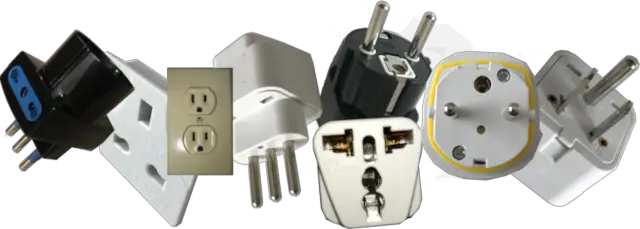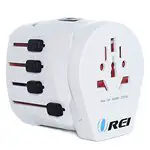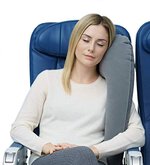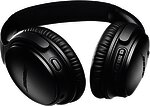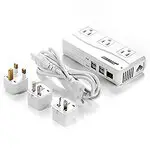How to use plugs from Namibia in Libya
Plugs, sockets, adapters and other information needed for travelling from Namibia to Libya in this page. If you want a report for other countries, re-start the wizard to find to electric adapters for your trip here.
Quick Chart at-a-glance
| Namibia | Libya | ||
|---|---|---|---|
| Voltage: | 220V. | 127V. |
|
| Plugs Type: | D, M. | D. |
|
| Hertz: | 50Hz. | 50Hz. |
|
If you are electrical savvy, perhaps the previous chart is all you need. If this is not the case, you can continue reading and discover what the chart is saying!
Plugs and Sockets at each country
In Namibia the following plugs are used: (includes Windhoek, Swakopmund, Lüderitz, Walvis Bay, Tsumeb, Rundu, Grootfontein.)
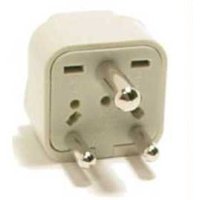
|
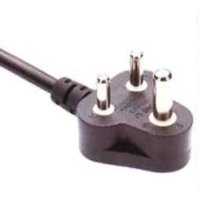
|
| Plug Type D | Plug Type M |

|
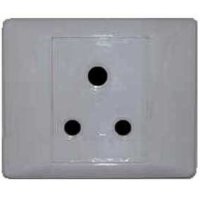
|
| Outlet Type D | Outlet Type M |
... and in Libya you will use: (includes Tripoli.)

|
| Plug Type D |

|
| Outlet Type D |
Voltage
Take care: Libya uses lower voltage than Namibia
Your electric devices from Namibia will be expecting 220 Volts, but Libya grid is of 127 Volts, this is a substantial difference that requires you to take some extra steps in preparation to your trip:
On the positive side, nowadays many devices will switch automatically to the network voltage and they will work just fine, i.e. mobile phone chargers are typically multi-voltage (but please, do actually check your own). It is important that you pay attention to your device's voltage. Connecting electronics to the wrong voltage, in the luckiest of the cases, the device will break or stop working temporarily; but please don't take this lightly, in the worst of the cases electrocution and fire hazards are a real possibility.

High-power devices don't usually handle different voltages due to the high-currents involved i.e. anything that its main purpose involves generating heat (or cold) like hair driers, baby bottle warmers, kettles, etc. On the contrary, modern low-power devices are likely to auto-detect and auto-adapt to different voltages i.e. usb chargers, laptop chargers, etc.
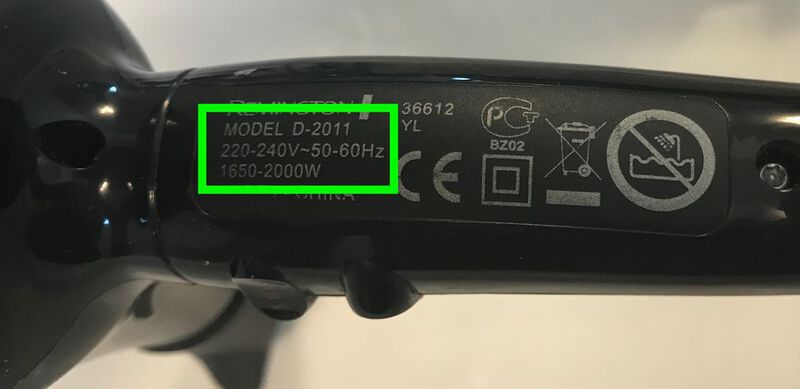
You will need a step down voltage converter a device that can be plugged to 127 volts and it provides an outlet with 220 volts for your Namibia' device. You will need to pay attention to the maximum power output of the converter and the maximum power consumption of the device.
Plugs Type
Some connectors are used in both countries
You will be able to plug the devices directly in Libya (please read other sections of this reports in regards to voltage, etc.). Perhaps you will need adapters for some sockets, but it is usually easier to find adapters at destination if your plug is already being used in the country. Sometimes different cities uses different systems, you might need to do a bit more of research. If you find more information please let us know.
Adapters
Im sorry, we can't find an adapter for your travel in our database.
Adapters you can buy
You can buy the following multi-purpose adapters from Amazon. Please also take a look at the recommended gadgets for your trip.
Hertz
Equal Hertz
This is the perfect situation. You will not have any clock shift issue with the same Hertz.
Finally, by the way ...
We are revamping the blog! Visit our new blog here.
↬ a link from your website helps too.
